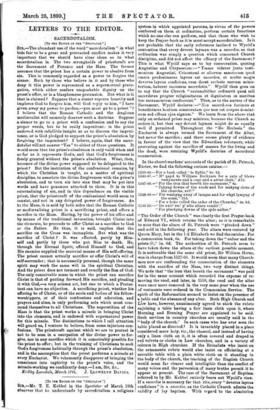LETTERS TO THE EDITOR.
SACE RD 0 TALISM.
pro THE EDITOR OP THE " SPECTATOR."] SIE,—The abundant use of the word" sacerdotalism " in what bids fair to be a great and protracted conflict makes it very important that we should have clear ideas as to what sacerdotalism is. The two strongholds of priestcraft are the Sacrament of Penance and the Mass. The former assumes that the priest has a certain power to absolve from sin. This is commonly regarded as a power to forgive the sinner. Both by those who believe in it and by those who deny it this power is represented as a supernatural prero- gative, which either confers unspeakable dignity on the priest's office, or is a blasphemous pretension. But what is it that is claimed ? Suppose that a sinner repents heartily and implores God to forgive him, will God reply to him, "I have given away my power to pardon,—you must go to a priest "? I believe that the Roman Catholic and the Anglican medievalist will earnestly disavow such a doctrine. Suppose a sinner to go to a priest with a confession and to say the proper words, but to be really impenitent: is the priest endowed with infallible insight so as to discern the impeni- tence, or is God pledged to support the priest's absolution by forgiving the impenitent? I believe, again, that the sacer- dotalist will not answer "Yes" to either of these questions. It would seem that the priest's absolution is only valid when and so far as it represents God's, and that God's forgiveness is freely granted without the priest's absolution. What, then, becomes of the divine power supposed to be delegated to the priest ? But the institution of the confessional remains, by which the Christian is taught, as a matter of spiritual discipline, to associate the divine forgiveness with the priest's absolution, and to turn sin into sins that may be put into words and have penances attached to them. It is in this externalising of sin, and in this dependence on the visible priest, that the priestcraft of the confessional would seem to consist, and not in any delegated power of forgiveness. As to the Mass, it is said by both sides that the Roman Catholic or medinvalising priest is a sacrificing priest, and offers a sacrifice in the Mass. Having, by the power of his office and by means of the traditional invocation, brought Christ into the elements, he proceeds to offer Christ as a sacrifice to God or the Father. He thus, it is said, implies that the sacrifice on the Cross was incomplete. But what was the sacrifice of Christ ? It was effected, partly by Him- self and partly by those who put Him to death. He, through the Eternal Spirit, offered Himself to God, and His enemies supplied the material means of His self-offering. The priest cannot actually sacrifice or offer Christ's will of self-surrender; that is necessarily personal, though the same spirit may work the same will in the spiritual Christian. And the priest does not torment and crucify the Son of God. The only conceivable sense in which the priest can sacrifice Christ is that of putting forward His sacrifice, and pleading it with God,—a very solemn act, but one to which a Protes- tant can have no objection. A sacrificing priest, whether his offering be of Christ, or of the souls and bodies of his fellow- worshippers, or of their confessions and adoration, and prayers and alms, is only performing acts which must com- mend themselves to all Christians. The superstition of the Mass is that the priest works a miracle in bringing Christ into the elements, and is endowed with supernatural power for this miracle. The distinctions to which I call attention will guard us, I venture to believe, from some injurious con- fusions. The priestcraft against which we are to protest is riot to be seen in a usurpation of the divine power to for- give, nor in any sacrifice which it is conceivably possible for the priest to offer ; but in the training of Christians to seek God's forgiveness habitually through the priest's absolution, and in the assumption that the priest performs a miracle at every Eucharist. We vehemently disapprove of bringing the conscience into captivity to the priest's voice, and the miracle-working we confidently deny.—I am, Sir, &e., Kirkby Lansdale, March 17th. J. LLEWELYN DAVIES.






































 Previous page
Previous page